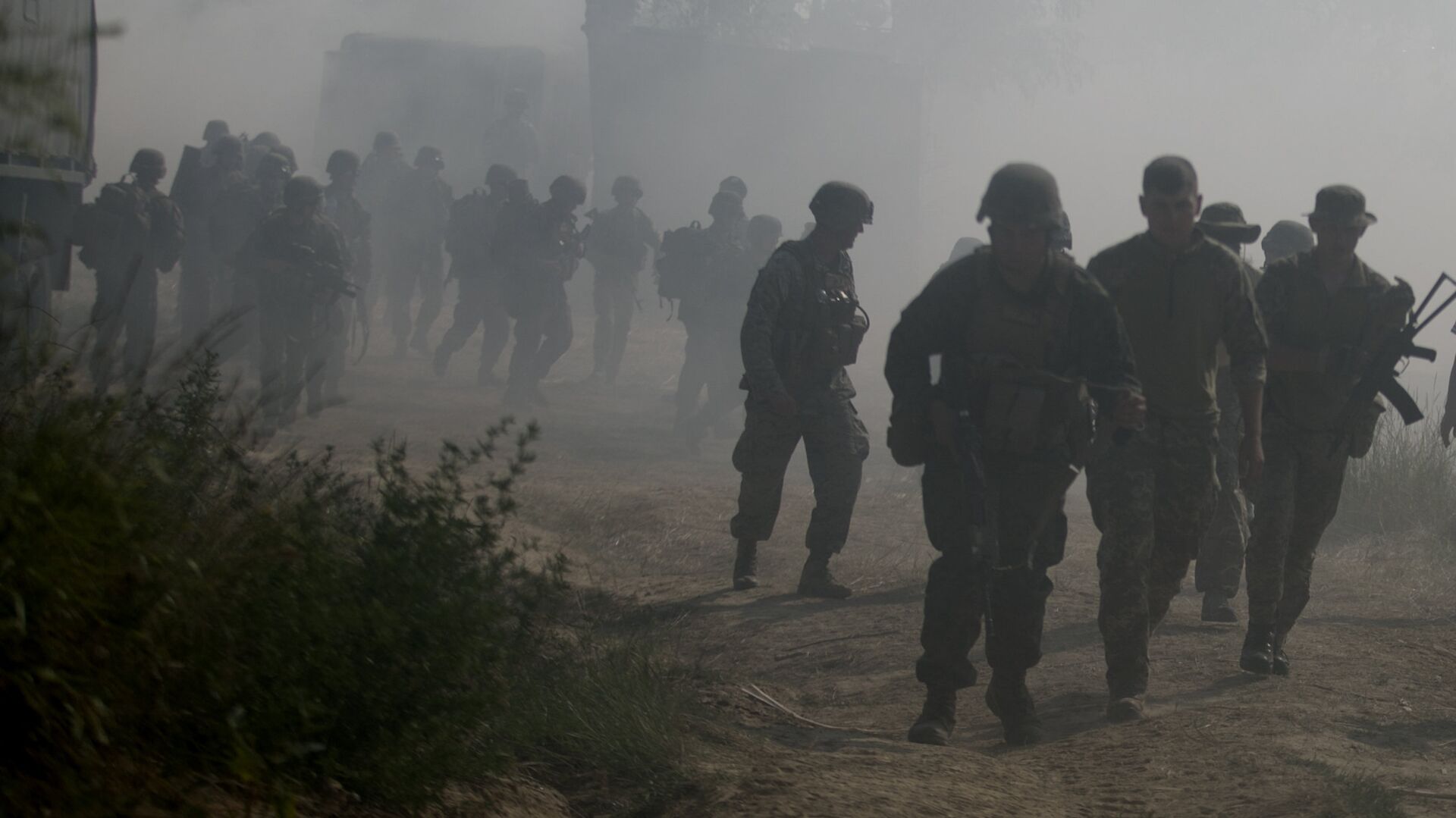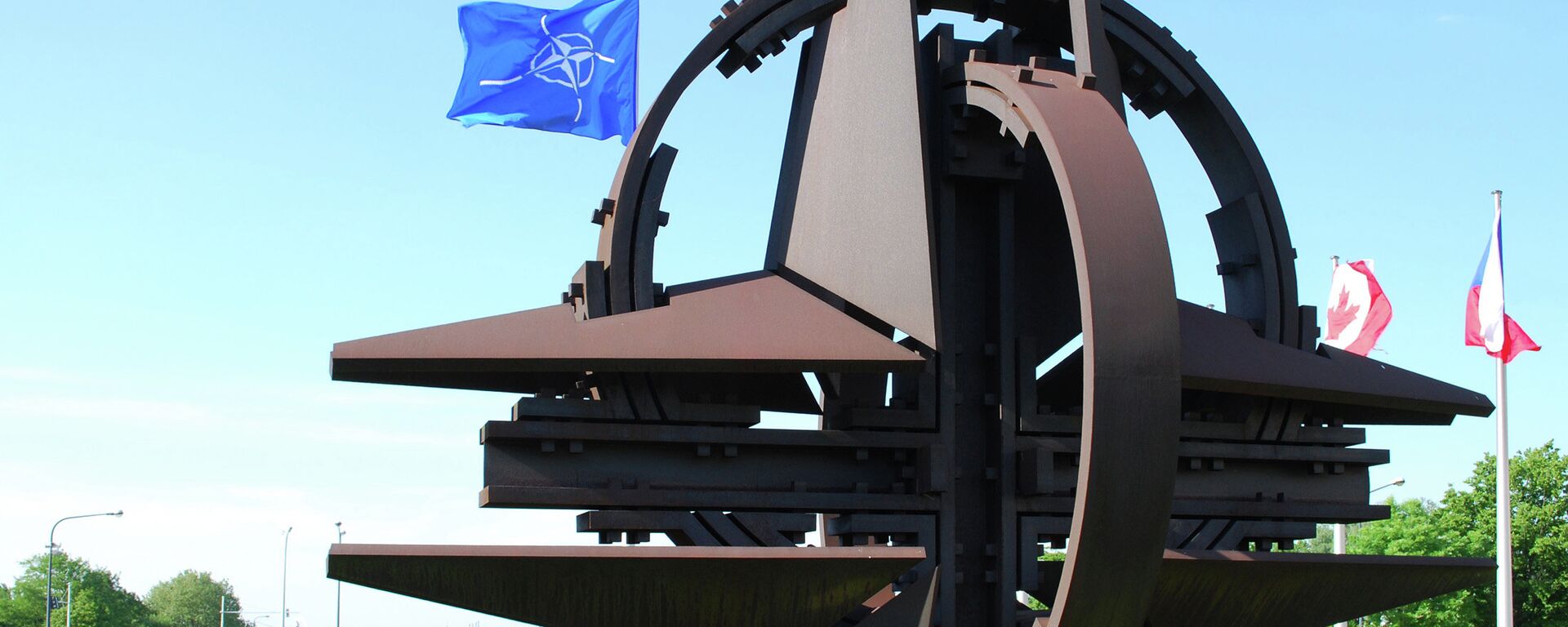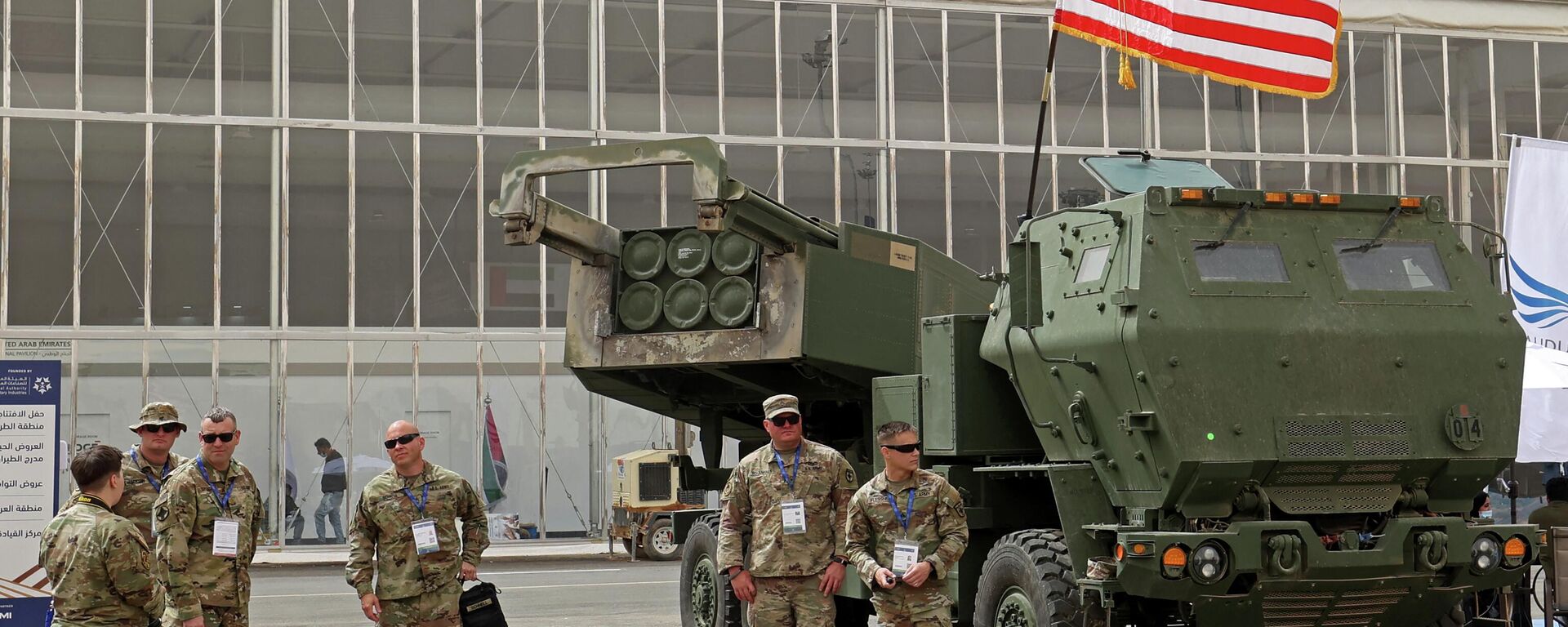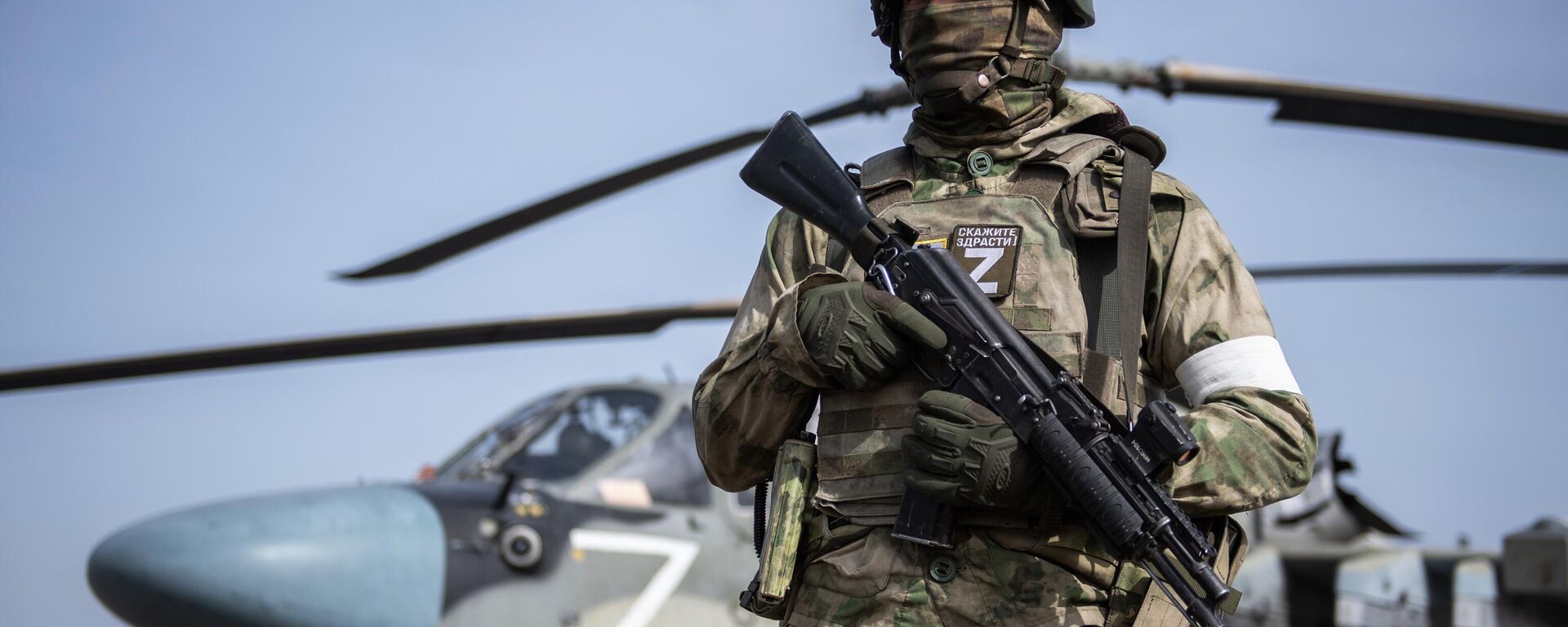https://sputnikglobe.com/20220627/military-experts-cia--nato-commandos-deployed-in-ukraine-show-kiev-is-proxy-in-us-war-on-russia-1096682341.html
Military Experts: CIA & NATO Commandos Deployed in Ukraine Show Kiev is Proxy in US War on Russia
Military Experts: CIA & NATO Commandos Deployed in Ukraine Show Kiev is Proxy in US War on Russia
Sputnik International
CIA personnel and commandos from the UK, France, Canada and Lithuania have been operating in Ukraine since the outset of the Russian special operation despite... 27.06.2022, Sputnik International
2022-06-27T05:04+0000
2022-06-27T05:04+0000
2022-06-27T05:04+0000
russia's special operation in ukraine
us
russia
world
opinion
ukraine
nato
cia
joe biden
george w. bush
https://cdn1.img.sputnikglobe.com/img/106633/70/1066337086_13:0:2232:1248_1920x0_80_0_0_8fd1058e17abd0e41afb67b5d1ac9400.jpg
"I believe the New York Times report is correct in every detail," says Philip Giraldi, a former CIA station chief and military intelligence officer. "It is what I have been hearing. There is considerable training at the Grafenwoehr, Germany army base to familiarize the Ukrainians with the new weapons arriving. Meanwhile there are cadres of special operations soldiers and intelligence personnel operating primarily in western Ukraine. They are not in uniform and many of them are working under various cover designations, including sometimes loose affiliations with foreign embassies and NGOs. All of which means that Biden and other Western leaders are lying about their active participation in the conflict."Ahead of the Russian special operation to demilitarize and de-Nazify Ukraine, the US withdrew its own 150 military instructors. However, some CIA operatives continued their service in the country secretly, directing most of the intelligence flow the US is sharing with Ukrainian forces, according to the NYT. In addition to that, commandos from Washington's NATO allies have been managing the flow of weapons and equipment in Ukraine and providing training. The NYT specifies, citing American and other Western officials that the commandos are not on the front lines with Ukrainian troops.Even though the US and NATO member states do not acknowledge that their personnel are operating in Ukraine, Russia and other intelligence services around the world are aware of this, according to the newspaper.Deploying CIA personnel (which encompasses military as well as intelligence operatives) "is completely typical of the initial stages of a US-backed long war, and for long-term political manipulation of the target country," according to retired US Air Force Lt. Col. Karen Kwiatkowski, a former analyst for the US Department of Defense."This is the future that neoconservative 'strategists' in DC and their British and European allies imagine for Ukraine," Kwiatkowski highlights. "Rather than a negotiated conclusion, with a new Ukrainian role as a neutral and productive country, independent of both Russian and US political influences, the US government and CIA see Ukraine as an expendable yet useful satrap in its competition with the Russian Federation."The ex-DoD analyst emphasizes that the effort is serious, given that the funding for CIA operations and arms sales and support and training has been flowing freely from Congress and President Biden. It also means that the intel operations in and around Ukraine are "of critical importance" to Washington, according to her.Ukraine is Washington's Proxy in Effort to Destroy RussiaWashington's current interest in Ukraine dates back to at least the George W. Bush era, and probably much earlier, with the US foreign policy establishment making steady efforts to drive a wedge between Russia and its neighbor, according to the military veteran. Washington has made considerable financial, diplomatic and political investment in Ukraine over the recent decades and it cannot afford "losing" it."Coming on the heels of similar 'losses' in Afghanistan, Iraq, Libya, Syria, and potentially some of the Gulf states, there are those in Washington who would find the complete loss of Ukraine unacceptable," she stresses.The US is equally involved in former Soviet and Warsaw Pact countries, such as Lithuania, and Poland, to take the post-Soviet space under control "as part of the war to maintain US influence and contain Russian influence," according to the former Pentagon analyst. "Recent Lithuanian steps to enforce EU sanctions on the Russian Baltic Sea trade port and naval city of Kaliningrad speaks to the nature of what is to come, in the eyes of the US strategists," she points out."Ukraine is a proxy; the West is trying to destroy Russia, it's that simple," echoes Larry Johnson, a veteran of the CIA and the State Department’s Office of Counter Terrorism, which provided training to the US Military’s Special Operations taskforce for 24 years. "It would be one thing if Russia was the most evil, oppressive, authoritarian regime in the world. It's nowhere even close. Even though the West keeps trying to portray Russia as such. The fact of the matter is, the West wants the resources that Russia has and it wants to control Russia. Russia is not about to be controlled."US Trying to Find the Way Out of Ukraine's MessDespite CIA and NATO personnel being deployed in Ukraine and NATO weapons constantly flowing to the country, Ukrainian troops have been increasingly outgunned by DPR/LPR military groups backed by Russia, acknowledges the NYT.The newspaper names a number of reasons behind the Ukrainian Armed Forces' failures, including limited time for training to use sophisticated NATO weapons; huge losses among the "most battle-hardened" and well-trained Ukrainian forces; and certain limits to the expertise of the CIA, which is traditionally focused on counter-intelligence, among other matters."This is the fault of Hollywood," says Johnson. "There's always the assumption that all these CIA personnel are really some terrific people. They've got magical training capabilities. They don't. The CIA hasn't won a single insurgent war in the last 40 years, except going back to supporting the mujahedeen against the Soviets in Afghanistan. They're hoping to try to recreate that miracle. But again, the problem is the people who are assigned militarily to this kind of CIA activity are either retired, special forces, special operations personnel who had to get out because they were either physically unable to perform according to military standards, or it's people who've always wanted to do that kind of thing but really have had no special training in it."The former CIA analyst raises the question about the timing of the NYT exposure. He notes that it has never been a secret that in every foreign conflict the US was interested in, the US has routinely provided training and assistance, and dispatched the CIA's Special Activities Division to operate on the ground. Why is NYT openly writing about it now?"I think the answer lies in the very last paragraph, last sentence of the article, where it is said: 'Would the enhancement of training be worth the possible price that is going to have to be paid?' The answer is 'probably not.' In other words, this is a gesture to show 'yeah, look, we're doing everything we can do to help the Ukrainians, we've provided we've provided special forces, special operations forces, we've brought them into other countries, we're sending our own people there, the CIA and their passive intelligence, so they can target Russian positions.' But when all is said and done, doing more is not going to really help."According to Johnson, the NYT piece is "really sending a signal that the United States is trying to figure out how to disengage from this mess."
https://sputnikglobe.com/20220405/nato-is-de-facto-at-war-with-russia-but-is-using-ukraine-as-a-tool-us-scholar-says-1094507130.html
https://sputnikglobe.com/20220606/ex-cia-analyst-us-military-aid-not-a-game-changer-for-kiev-ukraine-has-already-lost-1096064822.html
https://sputnikglobe.com/20220522/us-military-expert-russia-to-score-major-victories-in-donbass-must-adapt-to-new-nato-game-1095703665.html
ukraine
kaliningrad
lithuania
poland
Sputnik International
feedback@sputniknews.com
+74956456601
MIA „Rossiya Segodnya“
2022
News
en_EN
Sputnik International
feedback@sputniknews.com
+74956456601
MIA „Rossiya Segodnya“
Sputnik International
feedback@sputniknews.com
+74956456601
MIA „Rossiya Segodnya“
us, opinion, ukraine, nato, cia, joe biden, george w. bush, cold war, nato expansion, kaliningrad, lithuania, poland
us, opinion, ukraine, nato, cia, joe biden, george w. bush, cold war, nato expansion, kaliningrad, lithuania, poland
Military Experts: CIA & NATO Commandos Deployed in Ukraine Show Kiev is Proxy in US War on Russia
CIA personnel and commandos from the UK, France, Canada and Lithuania have been operating in Ukraine since the outset of the Russian special operation despite the US and NATO denying deploying their forces there, according to the New York Times. Are the West's covert efforts worth the pain as Ukrainian troops are increasingly outgunned?
"I believe the New York Times report is correct in every detail," says Philip Giraldi, a former CIA station chief and military intelligence officer. "It is what I have been hearing. There is considerable training at the Grafenwoehr, Germany army base to familiarize the Ukrainians with the new weapons arriving. Meanwhile there are cadres of special operations soldiers and intelligence personnel operating primarily in western Ukraine. They are not in uniform and many of them are working under various cover designations, including sometimes loose affiliations with foreign embassies and NGOs. All of which means that Biden and other Western leaders are lying about their active participation in the conflict."
Ahead of the Russian special operation to demilitarize and de-Nazify Ukraine, the US withdrew its own 150 military instructors. However, some CIA operatives continued their service in the country secretly, directing most of the intelligence flow the US is sharing with Ukrainian forces,
according to the NYT. In addition to that, commandos from Washington's NATO allies have been managing the flow of weapons and equipment in Ukraine and providing training. The NYT specifies, citing American and other Western officials that the commandos are not on the front lines with Ukrainian troops.
Even though the US and NATO member states do not acknowledge that their personnel are operating in Ukraine, Russia and other intelligence services around the world are aware of this, according to the newspaper.
"The potential downside for the president comes when some of these soldiers in mufti get killed or, worse, captured and start to talk about their role," says Giraldi. "The Biden Administration has staked its reputation and possible political future on enabling Ukraine to survive without succumbing to Russian demands."
Deploying CIA personnel (which encompasses military as well as intelligence operatives) "is completely typical of the initial stages of a US-backed long war, and for long-term political manipulation of the target country," according to retired US Air Force Lt. Col. Karen Kwiatkowski, a former analyst for the US Department of Defense.
"This is the future that neoconservative 'strategists' in DC and their British and European allies imagine for Ukraine," Kwiatkowski highlights. "Rather than a negotiated conclusion, with a new Ukrainian role as a neutral and productive country, independent of both Russian and US political influences, the US government and CIA see Ukraine as an expendable yet useful satrap in its competition with the Russian Federation."
The ex-DoD analyst emphasizes that the effort is serious, given that the funding for CIA operations and arms sales and support and training has been flowing freely from Congress and President Biden. It also means that the intel operations in and around Ukraine are "of critical importance" to Washington, according to her.
Ukraine is Washington's Proxy in Effort to Destroy Russia
"Ukraine was being used long before 2021 and 2022, as a US proxy, for global money laundering by multiple players, and for CIA political operations," explains Kwiatkowski. "The US diplomats and the CIA view Ukraine and its various people as pawns on a chessboard they can manage. Given that the US people are not willing to engage in a ground or air war with Russia over Ukraine, those pawns might need to be preserved for the next stage."
Washington's current interest in Ukraine dates back to
at least the George W. Bush era, and probably much earlier, with the US foreign policy establishment making steady efforts to drive a wedge between Russia and its neighbor, according to the military veteran. Washington has made considerable financial, diplomatic and political investment in Ukraine over the recent decades and it cannot afford "losing" it.
"Coming on the heels of similar 'losses' in Afghanistan, Iraq, Libya, Syria, and potentially some of the Gulf states, there are those in Washington who would find the complete loss of Ukraine unacceptable," she stresses.
The US is equally involved in former Soviet and Warsaw Pact countries, such as Lithuania, and Poland, to take the post-Soviet space under control
"as part of the war to maintain US influence and contain Russian influence," according to the former Pentagon analyst. "Recent Lithuanian steps to enforce EU sanctions on
the Russian Baltic Sea trade port and naval city of Kaliningrad speaks to the nature of what is to come, in the eyes of the US strategists," she points out.
"
Ukraine is a proxy; the West is trying to destroy Russia, it's that simple," echoes Larry Johnson, a veteran of the CIA and the State Department’s Office of Counter Terrorism, which provided training to the US Military’s Special Operations taskforce for 24 years. "It would be one thing if Russia was the most evil, oppressive, authoritarian regime in the world. It's nowhere even close. Even though the West keeps trying to portray Russia as such. The fact of the matter is, the West wants the resources that Russia has and it wants to control Russia. Russia is not about to be controlled."
US Trying to Find the Way Out of Ukraine's Mess
Despite CIA and NATO personnel being deployed in Ukraine and
NATO weapons constantly flowing to the country, Ukrainian troops have been increasingly outgunned by DPR/LPR military groups backed by Russia, acknowledges the NYT.
The newspaper names a number of reasons behind the Ukrainian Armed Forces' failures, including limited time for training to use sophisticated NATO weapons; huge losses among the "most battle-hardened" and well-trained Ukrainian forces; and certain limits to the expertise of the CIA, which is traditionally focused on counter-intelligence, among other matters.
"This is the fault of Hollywood," says Johnson. "There's always the assumption that all these CIA personnel are really some terrific people. They've got magical training capabilities. They don't. The CIA hasn't won a single insurgent war in the last 40 years, except going back to supporting the mujahedeen against the Soviets in Afghanistan. They're hoping to try to recreate that miracle. But again, the problem is the people who are assigned militarily to this kind of CIA activity are either retired, special forces, special operations personnel who had to get out because they were either physically unable to perform according to military standards, or it's people who've always wanted to do that kind of thing but really have had no special training in it."
The former CIA analyst raises the question about the timing of the NYT exposure. He notes that it has never been a secret that in every foreign conflict the US was interested in, the US has routinely provided training and assistance, and dispatched the CIA's Special Activities Division to operate on the ground. Why is NYT openly writing about it now?
"I think the answer lies in the very last paragraph, last sentence of the article, where it is said: 'Would the enhancement of training be worth the possible price that is going to have to be paid?' The answer is 'probably not.' In other words, this is a gesture to show 'yeah, look, we're doing everything we can do to help the Ukrainians, we've provided we've provided special forces, special operations forces, we've brought them into other countries, we're sending our own people there, the CIA and their passive intelligence, so they can target Russian positions.' But when all is said and done, doing more is not going to really help."
"I think the purpose of this article coming out now is just to lay the groundwork for why we can't put or shouldn't put any more US military personnel or even CIA personnel inside Ukraine," the CIA veteran emphasizes. "Because continuing to put US personnel, whether they're CIA or military, inside Ukraine to train, is becoming too risky because of Russia's success on the battlefield."







